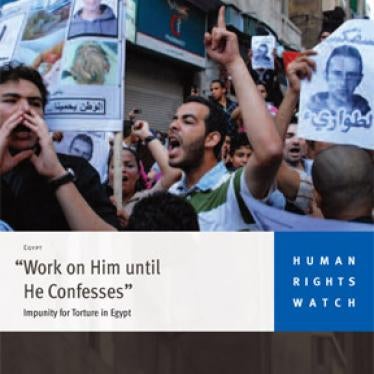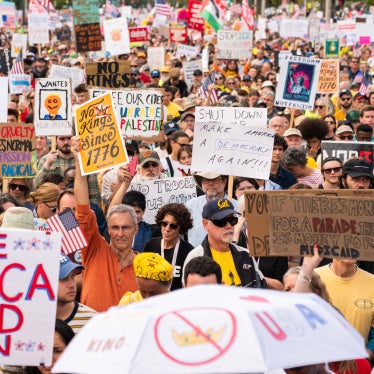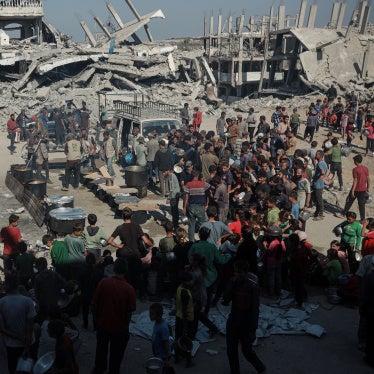(Cairo) - The Egyptian government should end an escalating crackdown on what appear to be largely peaceful protests against police brutality, poverty, and corruption, Human Rights Watch said today. Ahead of demonstrations planned for January 28, 2011, security forces need to ensure that force is only used when strictly necessary, such as to prevent violence, and only to the minimum extent necessary.
At least eight demonstrators and one policeman have been killed in three days of protests in Cairo, Suez, Alexandria and other Egyptian cities. Police have fired rubber bullets and tear-gas, used water cannon and baton charges, and even thrown rocks at protesters. Over 1,200 have been arrested over the past three days, many of them still in detention, and many others beaten. The government has warned that further demonstrations will not be tolerated.
"The Egyptian authorities should allow protesters to exercise their right to assemble and protest peacefully," said Joe Stork, deputy Middle East and North Africa director at Human Rights Watch. "Instead protesters have met with exactly the kind of heavy-handed abuse and repression that people are protesting against."
In Suez, at least three protesters died as a result of clashes with police; and others, as well as police, were wounded. On January 25 several hundred demonstrators began assembling in Arba'in Square and the number grew to at least several thousand over the course of the afternoon but remained peaceful until evening. Around 6 P.M. clashes broke out when some demonstrators attempted to march to local government headquarters. Police responded to youths throwing rocks with batons, tear gas, and water cannons. Mustafa Ragab, in his late teens, was shot to death. Officials acknowledged that security forces used rubber bullets that evening; protesters claimed authorities used live ammunition as well. Human Rights Watch viewed a medical report from Suez General Hospital stating that 23-year-old Yasir Al-Sayid Mahmud was wounded that evening by a bullet, but the report did not specify if it was a rubber bullet or a regular cartridge. Dr. Said Rifaat Ali, a 44-year-old pediatrician and opposition political activist, told Human Rights Watch that the wounds he observed as a hospital volunteer that evening could only have been caused by live ammunition.
Human Rights Watch staff witnessed numerous instances in which the police used excessive force against the largely peaceful demonstration in Tahrir Square in downtown Cairo on January 25 and 26. At least 10,000 people gathered on January 25, one of several demonstrations that took place around Egypt that day.
Human Rights Watch documented cases in which police beat unarmed protesters or made disproportionate use of tear gas without adequate precautions. Human Rights Watch staff witnessed an episode lasting at least three minutes in which riot police and some demonstrators threw stones at each other. It was the third time Human Rights Watch staff has witnessed Egyptian riot police holding shields throw stones at protesters, which is not consistent with international standards on the use of force and policing.
There was an escalation in reports of police use of force against demonstrators in cities and towns across the country on both days. The authorities were trying to stamp out the wave of protests inspired by weeks of demonstrations in Tunisia, which culminated earlier in January in the collapse of the 25-year old dictatorship of President Zine Al Abidine Bin Ali.
"We have seen wholly unacceptable and disproportionate policing of these protests," Stork said. "Instead of further crackdowns, the authorities should be investigating the widespread reports of excessive use of force by the police and holding those responsible to account."
One of the main demands of protesters in recent days has been to end emergency laws, which the Egyptian government has for decades used to severely curtail the right of its citizens to protest and assemble peacefully.
The managing editor of the online daily Al Masry al-Youm English, Lina Attallah, was covering the protest on January 25 on Kasr al-Aini street in central Cairo when the police started using the water cannons on the protesters. She told Human Rights Watch:
I was trying to run away from the water cannon and moved into a side-street. At that point three security officers in uniform grabbed me and pulled me by the hair to the ground. They kicked me in the face and broke my glasses; they kicked me on the back. They said, "You animal, you daughter of a dog, how dare you insult us." I have bruises all over my face and my back. They grabbed my phone and my blackberry. They kicked me in the head.
I tried to say I was a journalist but they didn't hear me. At one point a young man came up to try to help me saying, "Leave her, she's my sister." So they arrested him and took him to the police van. Another journalist saw me and came and told them that I was a journalist and that's when they let me go and moved away quickly.
In Alexandria, Kotb Hassanein, a member of the opposition Al-Ghad party, told Human Rights Watch:
I was at the [Alexandria] governorate [building] and there was a cordon in front of us and behind us when they used tear gas on us to make us move. The protesters kept chanting and that's when they beat us. We ran and they started chasing us down the alleyways.
Security officials confirmed to Agence France Press that over the last three days police have arrested at least 1,000 demonstrators. A coalition of lawyers from human rights organizations, the Front to Defend Egyptian protesters, has assembled a documented list of at least 800 names. Khaled Ali from the Egyptian Centre for Economic and Social Rights told Human Rights Watch that security officers arrested at least 16 protesters in the emergency rooms of Imbaba, Demerdash, and Mounira hospitals in Cairo.
The authorities have released some protesters but are detaining the vast majority in camps run by Central Security. Lawyers in Suez, where some of the worst violence against protesters took place on January 25, say that at least 300 remain detained which fuelled further angry protests over the next days. In Alexandria, 50 detainees were brought before a prosecutor on January 26, who ordered their provisional detention for 15 days pending investigation on charges of illegal demonstrating. Another 166 in Cairo and 64 in Alexandria were brought before various prosecutors around Cairo who ordered their release.
"Given the record of the Egyptian security forces, we have real concerns about the possible mistreatment of detainees," Stork said. "Those arrested on credible suspicion of engaging in criminal acts should be charged and immediately brought before an independent judge. Otherwise the demonstrators who were arrested should be released."
In a move reminiscent of the Tunisian government's censorship of the internet, on January 25, the authorities blocked Twitter and Bambuser, the video-sharing website, and some web-based news sites. It was an apparent effort to disrupt protests, which in recent years have increasingly been organized through social networking websites. Mobile phone networks were also been temporarily suspended on January 25 in some areas where protests have been taking place.
"These efforts to block the free flow of information show that, as in Tunisia, the Egyptian authorities are trying to prevent details of the violent crackdown on peaceful protests from reaching the public," Stork said. "But the Egyptian government should be listening to what the protesters are saying, not stifling the expression of their grievances."







